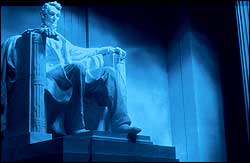
Our Best Security

| ||
|
Gail Armstrong Executive Editor |

he security of a nation is the intelligence and understanding of its people,” wrote U.S. Rep. John Moss, known as the father of the Freedom of Information Act, in a 1981 essay.
Since September 11, security has understandably dominated the United States’ domestic affairs. Officials and representatives accountable to the people and to the principles of democracy have made efforts to balance the need for security with citizens’ right to access the decisions and actions of their government.
Few would argue that officials must act sensibly to prevent an evil-intentioned minority from accessing government information that would assist them in harming others.
The question persists: How far can one go in restricting the law-abiding majority’s right to know in order to protect them from an unlawful minority?
Beginning in 1954, Moss’ Select Subcommittee on Government Information and Individual Rights planted the seeds of increased government accountability and the people’s right to know, at a time when Senator Joseph McCarthy’s red scare was grabbing headlines.
Passage of the act in 1966 placed the United States in an entirely new league of democracy—one in which a government by and for the people is more closely approached than in any other nation on Earth.

| ||
Today, for example, we can better understand forces at work in shaping terrorism, as revealed in our cover story, because of discoveries made under the Freedom of Information Act. In the 1970s, journalists, Freedom among them, acquired records documenting U.S. intelligence agency projects from the ‘50s and ’60s that exploited psychiatric techniques of manipulating behavior. The purpose, as a 1960 CIA memo described, was to produce “control of future behavior” in an individual, “including behavior in conflict with the subject’s normal pattern.” Experiments included efforts to induce a subject “to perform an act of attempted assassination, involuntarily.” The work here, however, was not isolated; facts indicate that such methods have an extensive history in Russia, China and elsewhere, and that they are key ingredients in today’s cauldron of Middle Eastern and South Asian politics.
In October 2001, the public’s right to know was usurped—which even the most alert American citizens didn’t know until weeks afterward. U.S. Attorney General John Ashcroft, with a single memo that month, virtually eliminated the Freedom of Information Act as we know it by encouraging agencies to take wide latitude in withholding records from the people because of the “institutional, commercial, and personal privacy interests that could be implicated by disclosure of the information.”
Challenges to this move are under way, but that it could have happened without any alarm sounding is disconcerting. Nothing about our freedoms is guaranteed unless we make them so. A people must be vigilant—and make their voices heard.
The principles of democracy carry an inherent risk: that freedoms granted all men may be abused by a few. As our nation’s forefathers knew all too well, however, it is a calculated risk, and one that has resulted in far more peace, progress and good than it has not.
Security is guaranteed by holding high the spirit of freedom and individual rights upon which this country was founded.
As Abraham Lincoln told those gathered in Edwardsville, Illinois, on September 11, 1858, “Our defense is in the spirit which prized liberty as the heritage of all men, in all lands everywhere. Destroy this spirit and you have planted the seeds of despotism at your own doors.”

